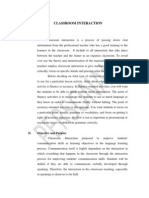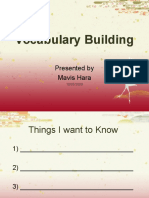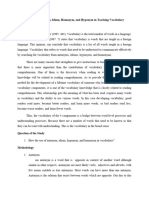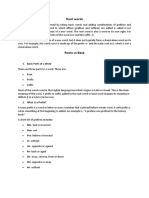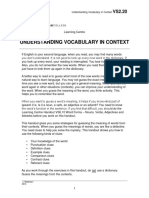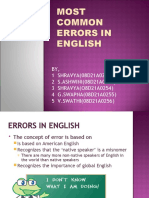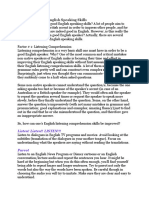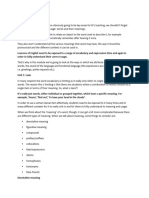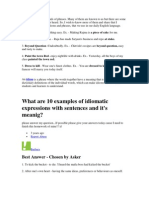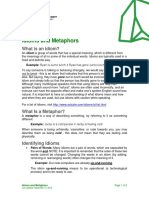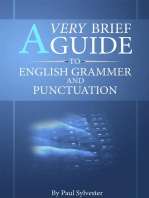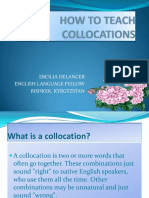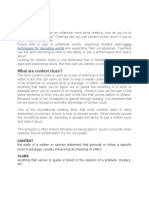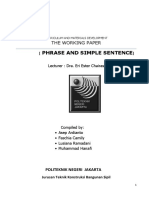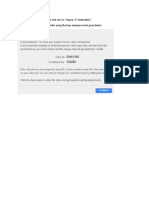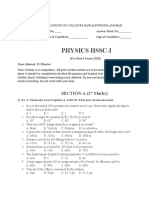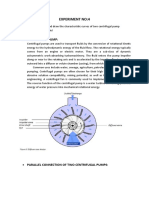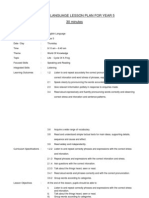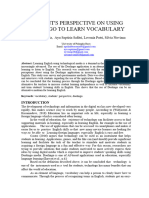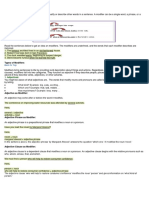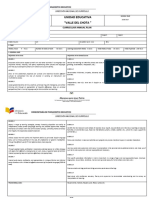0 ratings0% found this document useful (0 votes)
37 viewsVocabulary
Vocabulary
Uploaded by
book wormThe document provides steps for building vocabulary, including using context clues, word parts like prefixes and roots, reading widely from a variety of materials, and using new words. It emphasizes learning Greek and Latin roots that can reveal meanings of many related words, and suggests reading regularly in a consistent, long-term way to continuously learn new words.
Copyright:
© All Rights Reserved
Available Formats
Download as PPT, PDF, TXT or read online from Scribd
Vocabulary
Vocabulary
Uploaded by
book worm0 ratings0% found this document useful (0 votes)
37 views31 pagesThe document provides steps for building vocabulary, including using context clues, word parts like prefixes and roots, reading widely from a variety of materials, and using new words. It emphasizes learning Greek and Latin roots that can reveal meanings of many related words, and suggests reading regularly in a consistent, long-term way to continuously learn new words.
Original Description:
Vocabulary
Copyright
© © All Rights Reserved
Available Formats
PPT, PDF, TXT or read online from Scribd
Share this document
Did you find this document useful?
Is this content inappropriate?
The document provides steps for building vocabulary, including using context clues, word parts like prefixes and roots, reading widely from a variety of materials, and using new words. It emphasizes learning Greek and Latin roots that can reveal meanings of many related words, and suggests reading regularly in a consistent, long-term way to continuously learn new words.
Copyright:
© All Rights Reserved
Available Formats
Download as PPT, PDF, TXT or read online from Scribd
Download as ppt, pdf, or txt
0 ratings0% found this document useful (0 votes)
37 views31 pagesVocabulary
Vocabulary
Uploaded by
book wormThe document provides steps for building vocabulary, including using context clues, word parts like prefixes and roots, reading widely from a variety of materials, and using new words. It emphasizes learning Greek and Latin roots that can reveal meanings of many related words, and suggests reading regularly in a consistent, long-term way to continuously learn new words.
Copyright:
© All Rights Reserved
Available Formats
Download as PPT, PDF, TXT or read online from Scribd
Download as ppt, pdf, or txt
You are on page 1of 31
Vocabulary Building
Steps
1. Increase your vocabulary by learning to
use CONTEXT CLUES, so that you
can teach yourself new words every
time you read.
2. Increase your vocabulary by learning to
use WORD PARTS so that you can
figure out word meaning by looking at
their prefixes, suffixes and roots.
Steps
3. READ WIDELY, READ A VARIETY OF
THINGS so that you will be exposed to
thousands of new words each month.
Keep a vocabulary journal to record the
interesting words you find, or make
word cards so that you can see your
vocabulary growing.
Steps
5. Use the Library to find other resources
for building your vocabulary.
Bookstores have “Word for Today”
calendars, crossword puzzles, and
vocabulary word card boxes.
6. USE your words from time to time in
conversations.
Context Clues - Synonyms
Context clues are often found in the
form of synonyms: words that mean the
same as the unknown word.
Synonyms may be purposely included
by an author to help readers understand
a less familiar word.
Context Clues - Synonyms
In such cases, the synonyms are
usually set off by special punctuation
within the sentence, such as commas,
dashes, or parentheses; and they may
be introduced by or and that is.
Context Clues - Synonyms
A synonym may also appear anywhere
in a sentence as a restatement of the
meaning of the unknown word.
1. Are you averse—opposed to—the decision?
2. His naivete, or innocence, was obvious.
3. The salesperson tried to assuage the angry
customer’s feeling, but there was no way to
soothe her.
Context Clues - Antonyms
Antonyms—words and phrases that
mean the opposite of the word – are
also useful as context clues.
Antonyms are often signaled by words
and phrases such as however, but, yet,
on the other hand, and in contrast.
Context Clues - Antonyms
1. My sister Ann is lively and outgoing; however, I
am rather introverted.
2. Religions in America are not static, but changing,
especially in this period of shifting values.
3. Many people have pointed out the harmful effects
that a working mother may have on the family, yet
there are many salutary effects as well.
Context Clues - Examples
Examples can serve as context clues
for a word.
Examples are often introduced with
such signal words as including and such
as.
Context Clues - Examples
1. Nocturnal creatures, such as bats and owls, have
highly developed senses that enable them to
function in the dark.
2. The adverse effects of this drug, including
dizziness, nausea, and headaches, have caused
it to be withdrawn from the market.
3. Common euphemisms include “final resting place”
(for “grave), “intoxicated” (for “drunk”), and
“comfort station” (for “toilet”).
General Sense of the
Sentence
In some cases, conclusion based on the
information given the word can be
drawn.
Asking yourself questions about the
sentence or passage may help you
make a fair accurate guess about the
meaning of the unfamiliar word.
General Sense of the
Sentence
1. A former employee, irate over having
been fired, broke into the plant and
deliberately wrecked several machines.
2. Despite the proximity of Ron’s house to
his sister’s he rarely sees her.
3. The car wash we organized to raise funds
was a fiasco, for it rained all day.
General Sense of the
Sentence - Exercises
1.He was born to a family that possessed
great wealth, but he died in indigence.
2.My friend Julie is a great procrastinator.
She habitually postpones doing things,
from household chores to homework.
General Sense of the
Sentence - Exercises
3.Since my grandfather retired, he has
developed such avocations as
gardening and long-distance bike riding.
4.The Lizard was so lethargic that I wasn’t
sure if it was alive or dead. It didn’t
even blink.
General Sense of the
Sentence - Exercises
5.The public knows very little about the
covert activities of CIA spies.
6.Many politicians do not give succinct
answers to questions, but long, vague
ones.
General Sense of the
Sentence - Exercises
7.Because my father had advised me to
scrutinize the lease, I took time to
carefully examine all the fine print.
8.In biology class today, the teacher
discussed such anomalies as two heads
and webbed toes on a human being.
General Sense of the
Sentence - Exercises
9.Nature has endowed hummingbirds with
the ability to fly backward.
10.Doctors should alleviate the pain of
terminal ill patients so that their final
days are as comfortable as possible.
Word Parts
Words can be made of combination of
different parts called
ROOTS (or BASES),
PREFIXES, and SUFFIXES.
Word Parts
Roots, prefixes, and suffixes have their
own separate meaning and can be
looked up individually in a dictionary.
These meanings suggest the overall
meanings of the words they compose.
Word Parts - Prefix
A PREFIX is a letter of group of letters
that come at the beginning of a word.
A prefix alters the meaning of a word.
Word Parts - Prefix
For example, adding the prefix un to the
word “happy” changes the meaning of
“happy” to the opposite of happy.
In addition, sometimes adding a prefix
changes the part of speech.
Word Parts - Prefix
An example of this adding the prefix dis
to the adjective “able” which produces
the verb “disable.”
Because of their significant impact on
root words, prefixes are the most
frequent word part studied.
Word Parts - Suffix
A SUFFIX is a word part added to the
end of the word.
It does not generally alter a word’s
meaning, but it will often change a word
from one part of speech to another.
For example, when the suffix -ness is
placed after the adjective “kind,” the
results is the noun “kindness.”
Word Parts - Root
A ROOT is a basic word to which
prefixes and suffixes can be added.
It cannot be further separated into parts
and is fairly constant in form and
meaning.
It can be found at the beginning, middle,
or end of a word.
Word Parts
Be aware that there are times when a
group of letters appears to be a prefix,
suffix, or root, but it is not.
For instance, the prefix anti- means
“against” or “opposite of” as in
“antisocial.”
However, anti- is not a prefix in the
work “anticipate” or “antique.”
Word Parts
Learning word parts is very useful in
building one’s vocabulary.
Roots and prefixes come from Greek
and Latin words.
One Latin or Greek word may provide
the clue to a dozen or more English
words.
Word Parts
One expert said that ten Latin words
and two Greek words are the basis for
2,500 English words.
The prefix pseudo which means “false”
is at the beginning of 800 words.
Read to Improve your
Vocabulary
1.Read even as little as 15 or 20 minutes
per day over a long period of time.
(a year)
2.It is important to read a significant
quantity of material. (about 20 pages
each day, 100 pages each week)
3.Read a variety of material
Read to Improve your
Vocabulary
4. Read consistently -- everyday
5. You can stop reading a book before finishing
it and choose another one.
6. Read books that are challenging to improve
your vocabulary.
7. Keep an informal daily journal of your
reading.
Use Your New Words
USE your new words that you learned
from time to time in conversations and
in your writings.
You might also like
- Portuguese English Frequency Dictionary - Essential Vocabulary - 2.500 Most Used Words: Portuguese, #1From EverandPortuguese English Frequency Dictionary - Essential Vocabulary - 2.500 Most Used Words: Portuguese, #1Rating: 3 out of 5 stars3/5 (3)
- ''The Goldlist Method'' To Learn VocabularyDocument6 pages''The Goldlist Method'' To Learn VocabularyThriwNo ratings yet
- Essential Japanese - An Introduction To The Standard Colloquial Language PDFDocument488 pagesEssential Japanese - An Introduction To The Standard Colloquial Language PDFMalcolm Tucker100% (1)
- Curriculum Development in Language TeachingDocument345 pagesCurriculum Development in Language TeachingAlonaNo ratings yet
- Classroom InteractionDocument7 pagesClassroom InteractionBarcaa Loona100% (4)
- Speaking Band Descriptors PDFDocument1 pageSpeaking Band Descriptors PDFIchsan FaridzNo ratings yet
- Vocabulary Building: Presented by Mavis HaraDocument42 pagesVocabulary Building: Presented by Mavis HaraRupesh KaushikNo ratings yet
- Improving VocabularyDocument39 pagesImproving VocabularyWatcharee WongthanetNo ratings yet
- English For Academic and Professional Purposes (Recovered)Document31 pagesEnglish For Academic and Professional Purposes (Recovered)Darrel Acuisa Fadrillan100% (1)
- IntroductionDocument8 pagesIntroductioncarsevolvedNo ratings yet
- Science g1Document8 pagesScience g1Kaleyx Cedrick MendozaNo ratings yet
- Module 1Document17 pagesModule 1Тигран МусаиловNo ratings yet
- EAPP Module 1Document3 pagesEAPP Module 1Niña Miles TabañagNo ratings yet
- Overview: Module 6Document23 pagesOverview: Module 6Islam TahaNo ratings yet
- A Guide To Dealing WithDocument13 pagesA Guide To Dealing WithJijoNo ratings yet
- MODULE-8-EPRO-1-OKDocument7 pagesMODULE-8-EPRO-1-OKJericho Miles GenteroneNo ratings yet
- ESEN Module 3 - CP1&2 ReviewerDocument17 pagesESEN Module 3 - CP1&2 ReviewerMarites J. CarlosNo ratings yet
- Knowledge of Words: Ernida Hamid, S.Ag., M.PDDocument49 pagesKnowledge of Words: Ernida Hamid, S.Ag., M.PDNikita MeylianiNo ratings yet
- Grammar and StyleDocument5 pagesGrammar and StyleoscarvanquelloNo ratings yet
- Understanding Vocabulary in ContextDocument4 pagesUnderstanding Vocabulary in ContextArizka PradnyaNo ratings yet
- AaptPrep Vocabulary Practive ExerciseDocument146 pagesAaptPrep Vocabulary Practive ExerciseRitesh Jain ANo ratings yet
- Most Common Mistakes in English For StudentsDocument27 pagesMost Common Mistakes in English For Studentsnarsingsanda100% (1)
- Factors Affecting English Speaking SkillsDocument8 pagesFactors Affecting English Speaking SkillsCharles Kevin Cañete ArabeNo ratings yet
- Guessing Meaning From ContextDocument15 pagesGuessing Meaning From ContextyenerzeynepNo ratings yet
- Term 1 LanguageDocument39 pagesTerm 1 Languagezynnie955No ratings yet
- How To Learn Vocabulary by DARREN ELLIOTTDocument2 pagesHow To Learn Vocabulary by DARREN ELLIOTTmariahkalNo ratings yet
- UntitledDocument66 pagesUntitledYankee1000No ratings yet
- SUMMARY Fatur RahmadDocument17 pagesSUMMARY Fatur RahmadFatur RahmatNo ratings yet
- Factors Affecting Listening and Speaking SkillsDocument26 pagesFactors Affecting Listening and Speaking SkillsYong Han LeeNo ratings yet
- Parts of SpeechDocument6 pagesParts of SpeechRayene MedabisNo ratings yet
- Ten Ways To Improve Your VocabularyDocument3 pagesTen Ways To Improve Your VocabularyKhoa NguyenNo ratings yet
- Ten Ways To Improve Your Vocabulary PDFDocument3 pagesTen Ways To Improve Your Vocabulary PDFKhoa NguyenNo ratings yet
- Makalah Idiom and Phrasal Verb K.9Document11 pagesMakalah Idiom and Phrasal Verb K.9JunaidiNo ratings yet
- 1 WordDocument25 pages1 WordCiena MaeNo ratings yet
- Communicating Beyond Words (First Week)Document36 pagesCommunicating Beyond Words (First Week)Saheefa HussainNo ratings yet
- Factors Affecting ListeningDocument7 pagesFactors Affecting ListeningAlice WewenNo ratings yet
- Word StressDocument5 pagesWord StressKandi IssayaNo ratings yet
- Lexical Priming Hoey Med ArticleDocument3 pagesLexical Priming Hoey Med ArticlePablo Zamora GuijarroNo ratings yet
- Tefl Module 6Document21 pagesTefl Module 6jah forasahiNo ratings yet
- Lecture Notes For Sunday June 03, 2012 Content: Problem PartsDocument6 pagesLecture Notes For Sunday June 03, 2012 Content: Problem PartsDuval PearsonNo ratings yet
- IdiomsDocument76 pagesIdiomsLucia CighirNo ratings yet
- Communicating Beyond WordsDocument36 pagesCommunicating Beyond WordsmaalaikeashtarNo ratings yet
- ENG 102 Chapter I and 2Document14 pagesENG 102 Chapter I and 2disa rayNo ratings yet
- Diajukan Untuk Memenuhi Tugas Mata Kuliah: "Dr. Sukarsono, M.PD."Document7 pagesDiajukan Untuk Memenuhi Tugas Mata Kuliah: "Dr. Sukarsono, M.PD."abidNo ratings yet
- English Handbook: Webster University, ViennaDocument56 pagesEnglish Handbook: Webster University, ViennaSebastian CamachoNo ratings yet
- What Are 10 Examples of Idiomatic Expressions With Sentences and It's Meanig?Document5 pagesWhat Are 10 Examples of Idiomatic Expressions With Sentences and It's Meanig?babucpy100% (1)
- Idioms and Metaphors PDFDocument2 pagesIdioms and Metaphors PDFizzatisafeeNo ratings yet
- Idioms and Metaphors: What Is An Idiom?Document2 pagesIdioms and Metaphors: What Is An Idiom?izzatisafeeNo ratings yet
- UPCAT Language Proficiency Tips and TricksDocument11 pagesUPCAT Language Proficiency Tips and TricksAnna Bien Dela CruzNo ratings yet
- ENG8Q1L7-Determining The Meaning of Idiomatic Expressions byDocument29 pagesENG8Q1L7-Determining The Meaning of Idiomatic Expressions byJEROME SALAYNo ratings yet
- Eapp Module 1Document5 pagesEapp Module 1Aqua Rius (Giamanaqua)No ratings yet
- A Very Brief Guide To English Grammar And PunctuationFrom EverandA Very Brief Guide To English Grammar And PunctuationRating: 2 out of 5 stars2/5 (6)
- THE ART OF SPEAKING AMERICAN EN - Stephen Stratton PDFDocument128 pagesTHE ART OF SPEAKING AMERICAN EN - Stephen Stratton PDFGabriela Llaneza100% (2)
- Part 1: Aspects of PronunciationDocument8 pagesPart 1: Aspects of PronunciationLilya GilyazevaNo ratings yet
- Tasks One 5toDocument4 pagesTasks One 5toalejandra quispe povedaNo ratings yet
- How To Teach Collocations ErciliaDocument56 pagesHow To Teach Collocations ErciliaHOLTZ CODRUȚANo ratings yet
- Developing Your VocabularyDocument21 pagesDeveloping Your VocabularyJeannyrose GoyhaNo ratings yet
- Context CluesDocument11 pagesContext CluescheyeenNo ratings yet
- Phrase and Simple Sentence: The Working PaperDocument8 pagesPhrase and Simple Sentence: The Working PaperAsep ArdiantoNo ratings yet
- EAPP Lesson 1Document38 pagesEAPP Lesson 1roselyn acpacNo ratings yet
- Eapp 1Document34 pagesEapp 1Ivan Bayona50% (4)
- English Communication and CompositionDocument6 pagesEnglish Communication and CompositionRocky100% (1)
- Grammar and Research HandbookDocument46 pagesGrammar and Research HandbookMrsAndersonLHSS100% (1)
- LSA Questions: Video ELA 6 Semester B Unit 1 Lesson 1Document11 pagesLSA Questions: Video ELA 6 Semester B Unit 1 Lesson 1Matthew PorterNo ratings yet
- Swedish English Frequency Dictionary - Essential Vocabulary: Swedish, #1From EverandSwedish English Frequency Dictionary - Essential Vocabulary: Swedish, #1No ratings yet
- PLO4, CLO3, C4: Rubrics For AssessmentDocument2 pagesPLO4, CLO3, C4: Rubrics For Assessmentbook wormNo ratings yet
- PLZ Make One Page Assignment and Save As "Reg No. 1 Upload The Assignment On Turnitin Using The Keys and Passwords Given BelowDocument1 pagePLZ Make One Page Assignment and Save As "Reg No. 1 Upload The Assignment On Turnitin Using The Keys and Passwords Given Belowbook wormNo ratings yet
- Physics Pre-Board PaperDocument4 pagesPhysics Pre-Board Paperbook wormNo ratings yet
- Lab 4Document5 pagesLab 4book wormNo ratings yet
- Lab 4 18-Me-23Document6 pagesLab 4 18-Me-23book wormNo ratings yet
- FM-II Lecture 1Document10 pagesFM-II Lecture 1book wormNo ratings yet
- 4 - Adverbs, Prepositions, Conjunctions, InterjectionsDocument36 pages4 - Adverbs, Prepositions, Conjunctions, InterjectionsJose GremioNo ratings yet
- Анотації лекцій - Лексикологія англ мовиDocument24 pagesАнотації лекцій - Лексикологія англ мовиsemenal2907No ratings yet
- Role Play - Scoring Rubric 1Document1 pageRole Play - Scoring Rubric 1Baihaqi Zakaria MuslimNo ratings yet
- Listening Term 3 Workbook WITH KEYSDocument264 pagesListening Term 3 Workbook WITH KEYSVân Anh Nguyễn ThịNo ratings yet
- RPH Intan 3.4Document12 pagesRPH Intan 3.4Intan NaziraNo ratings yet
- Rationale Lesson PlanDocument8 pagesRationale Lesson PlanJesus CrespoNo ratings yet
- STD 6 EnglishDocument31 pagesSTD 6 EnglishShanthi Meena KumariNo ratings yet
- MC Sampler Pack PDFDocument195 pagesMC Sampler Pack PDFVedaste Ndayishimiye100% (2)
- Teaching Vocabulary Meaning Through Semantic-Based ActivitiesDocument43 pagesTeaching Vocabulary Meaning Through Semantic-Based Activitieswasi_akh19424No ratings yet
- Summary Chart: HOMONYMS Are Words That Sound Alike But Have DifferentDocument2 pagesSummary Chart: HOMONYMS Are Words That Sound Alike But Have DifferentGnanasekaran GrammatologistNo ratings yet
- Daftar Kalimat Regular Verb List (A-Z) Dan Artinya: Nama: Dimas Herlangga Nurohman Kelas: Manajemen 11Document26 pagesDaftar Kalimat Regular Verb List (A-Z) Dan Artinya: Nama: Dimas Herlangga Nurohman Kelas: Manajemen 11ourcourse officialNo ratings yet
- Intercultural Language Teaching: Principles For Practice: January 2004Document10 pagesIntercultural Language Teaching: Principles For Practice: January 2004Henry OsborneNo ratings yet
- 25 TEFL Lemon Flashcard GamesDocument35 pages25 TEFL Lemon Flashcard GamesЛюда Піддубна100% (1)
- Test Etymology 212 A, B, CDocument1 pageTest Etymology 212 A, B, CАнтон СимаковNo ratings yet
- Adjectivul in Limba EnglezaDocument10 pagesAdjectivul in Limba Englezaanon_850017478No ratings yet
- English Reviewer 2013Document14 pagesEnglish Reviewer 2013DIMPZ MAGBANUANo ratings yet
- Common Core Unit Development TemplateDocument9 pagesCommon Core Unit Development TemplateMichael KingNo ratings yet
- Lesson Plan For Year 5Document6 pagesLesson Plan For Year 5x_lee_2No ratings yet
- Crawford Task1 LPDocument12 pagesCrawford Task1 LPapi-327039356No ratings yet
- Student's Perspective On Using Duolingo To Learn Vocabulary-1Document9 pagesStudent's Perspective On Using Duolingo To Learn Vocabulary-1Aprilia FetrasoniaNo ratings yet
- Modifiers Are Words or Group of Words That Qualify or Describe Other Words in A Sentence. A Modifier Can Be A Single Word, A Phrase, or ADocument6 pagesModifiers Are Words or Group of Words That Qualify or Describe Other Words in A Sentence. A Modifier Can Be A Single Word, A Phrase, or AAbsquatulateNo ratings yet
- Y6 Formal and Informal Language Warm-UpDocument13 pagesY6 Formal and Informal Language Warm-UpsimkahhuiNo ratings yet
- Unidad Educativa "Valle Del Chota ": Curricular Annual PlanDocument24 pagesUnidad Educativa "Valle Del Chota ": Curricular Annual PlanAlexander RojasNo ratings yet
- EM02 TotDocument178 pagesEM02 TotAnderson JoelNo ratings yet




